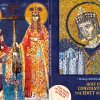Over the years, Ivana has been performing as a lead singer, choir director and vocal arranger, contributing her artistry on tours, seminars and music projects around the world.
.Ivana's collaborations include many internationally recognized musicians, including the Acid Jazz pioneers: "The Brand New Heavies".
Ivana is showcasing her artistry on New York City stages such as The Shrine, The Bitter End, Sugar Bar, Cleopatra's Needle, and Terra Blues, living her dream of continuing The Journey Of A Soul Bird.
Ивана Котов, вокална солисткиња и композиторка, завршила је на Берклију одсек за савремену композицију и вокално певање. Живи у Њујорку. Као вокална солисткиња сарађивала је са нашим познатим џез саксофонистом и композиторoм Јованом Маљоковићем и његовим Балкан Салса бендом.





